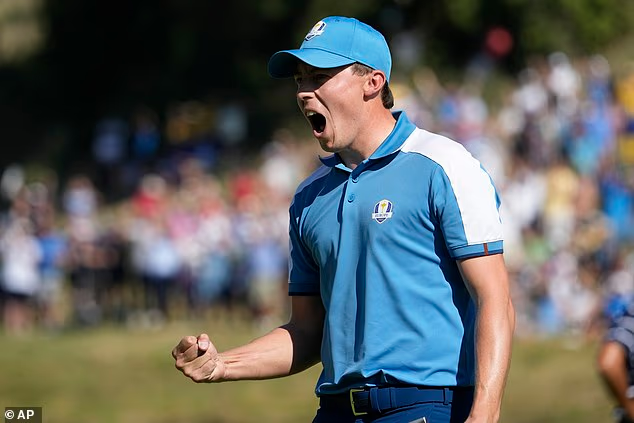Matt Fitzpatrick: A Statistical Outlier in Ryder Cup History
Matt Fitzpatrick is not just a talented golfer; he is a numbers-driven athlete who relies deeply on data and metrics to guide his decisions on the course. Yet, when it comes to certain statistics, particularly his performance in the Ryder Cup, he finds himself grappling with figures that tell an uncomfortable story. As the 2023 Ryder Cup approaches, Fitzpatrick’s past in this prestigious event is under scrutiny, with many questioning whether he can turn his luck around.
Fitzpatrick has played in three Ryder Cups, accumulating a mere one point across eight matches—a statistic that places him last among 119 golfers who have participated in at least five encounters since 1979. His winning percentage stands at just 12.5%. Such numbers cast a long shadow as he heads into another edition of the tournament. Despite his impressive abilities on the PGA Tour, where he won the U.S. Open in 2022, his Ryder Cup record has become a lingering concern.
The data does not paint an entirely bleak picture of Fitzpatrick’s career. Earlier this year, he faced a significant dip in form, plummeting from the top 10 in the world rankings to 85th. However, he has made a remarkable recovery, bouncing back to 29th after a series of strong performances, including a fourth-place finish at The Open. Nonetheless, the Ryder Cup questions remain: can a player with such a dismal record rise to the occasion when it matters most?
Fitzpatrick’s record prompts curiosity about Europe’s captain, Luke Donald, and the reasons behind selecting him for the 2023 Ryder Cup at Bethpage. In an interview with Daily Mail Sport, Fitzpatrick acknowledges the disappointment of his previous results but expresses a desire to change the narrative. He is eager to demonstrate that his past performances do not reflect his current skill level.
Reflecting on his debut Ryder Cup experience in 2016, Fitzpatrick admits to feeling unprepared. He was only 22 years old and lacked the necessary confidence to compete against the world’s best. Although he made the team through a points system, he left feeling he hadn’t adequately proven himself. “In 2016, I wasn’t ready,” he confesses. Yet, with several years of professional experience and a major victory under his belt, Fitzpatrick hopes that his recent successes can help shift perceptions.
Fitzpatrick also recalls his experience during the 2021 Ryder Cup, held at Whistling Straits, where he failed to earn any points again. He believes that circumstances at that event impacted his performance—specifically, the choice of his playing partner and his own inconsistencies. “I think the record doesn’t necessarily always do it justice,” he states, emphasizing that golf can be an unpredictable sport where skill doesn’t always translate to success.
Interestingly, in the recent 2023 Ryder Cup, Fitzpatrick managed to win one point, although much of the focus was on his partner, Rory McIlroy. Their first-round match saw them dominate, with Fitzpatrick showcasing his abilities by making five birdies and an eagle in the early holes. Reflecting on that experience, he remarks on the thrill of feeling “untouchable” and how quickly fortunes can change in golf.
The road to recovery for Fitzpatrick has not been without its challenges. After a frustrating period where results weren’t going his way, he made the bold decision to overhaul his team, switching both his caddie and coach. This change led to a resurgence, evidenced by a string of impressive finishes in major events. He describes this phase as “the hardest time of my career,” but it seems to have reinvigorated his game.
As Fitzpatrick prepares to take the stage in New York, one can sense a shift in his demeanor. Unlike earlier this year, when he was uncertain about his selection, he now appears more confident, ready to prove that he belongs on the Ryder Cup stage. “I wouldn’t say I was worried about not being picked,” he clarifies, but it was clear to him that he needed to elevate his play.
As the Ryder Cup unfolds, Fitzpatrick will be part of a European team that many now regard as evenly matched against their American counterparts. Despite the pressure, he asserts confidence in the squad’s abilities, pushing back against the narrative that the U.S. team is overwhelmingly stronger. He acknowledges the excellence of players like Justin Thomas and Scottie Scheffler, but insists that match outcomes aren’t determined solely by paper qualifications.
Ultimately, Fitzpatrick’s journey through the Ryder Cup reflects his resilience and growth as a player. The numbers may tell one story, but he aims to create his own narrative of success as he takes on the pressure and expectations of his fourth Cup appearance. With renewed determination and a clearer vision of his potential, Fitzpatrick is set on making this Ryder Cup a defining moment in his career.
As he steps onto the course once more, the world will be watching—can Matt Fitzpatrick finally fulfill the promise suggested by his strong form and recent achievements? The answer may very well be divulged in the thrilling matches of the 2023 Ryder Cup.


